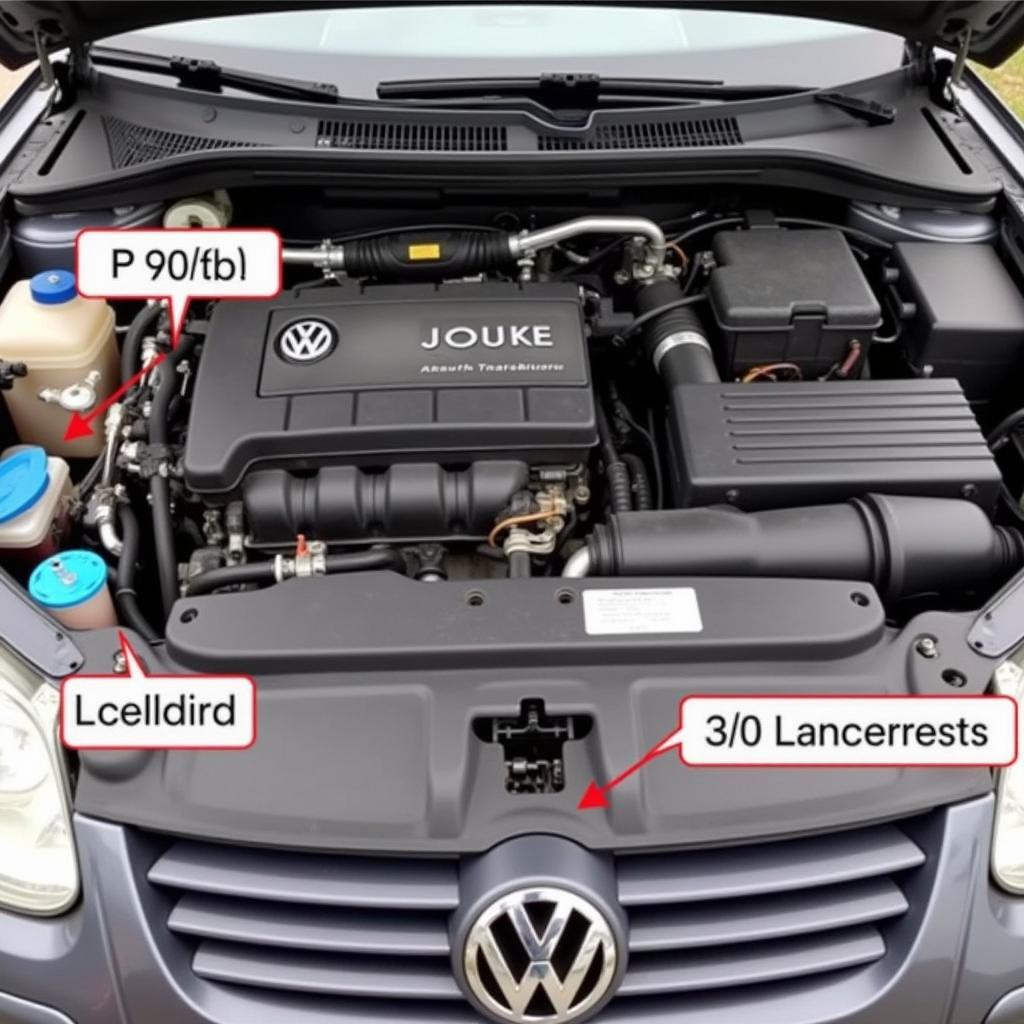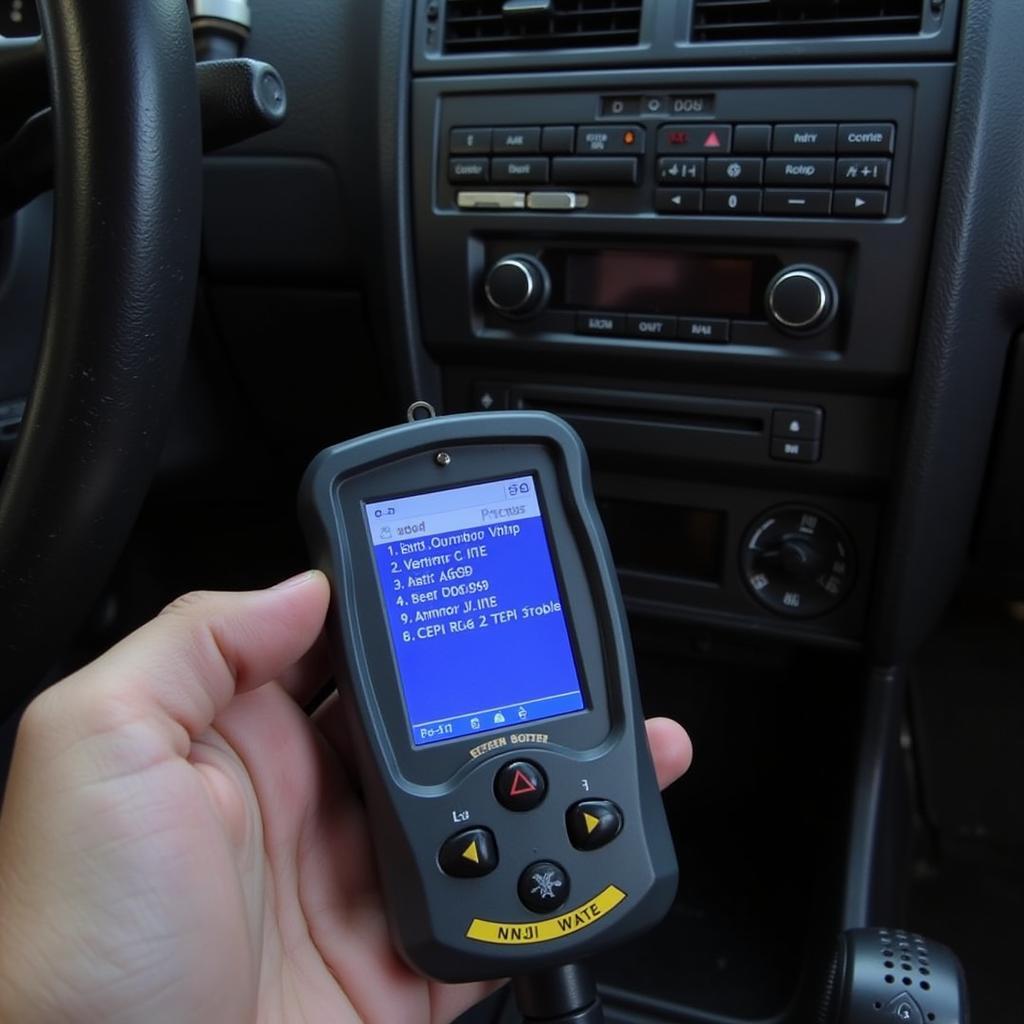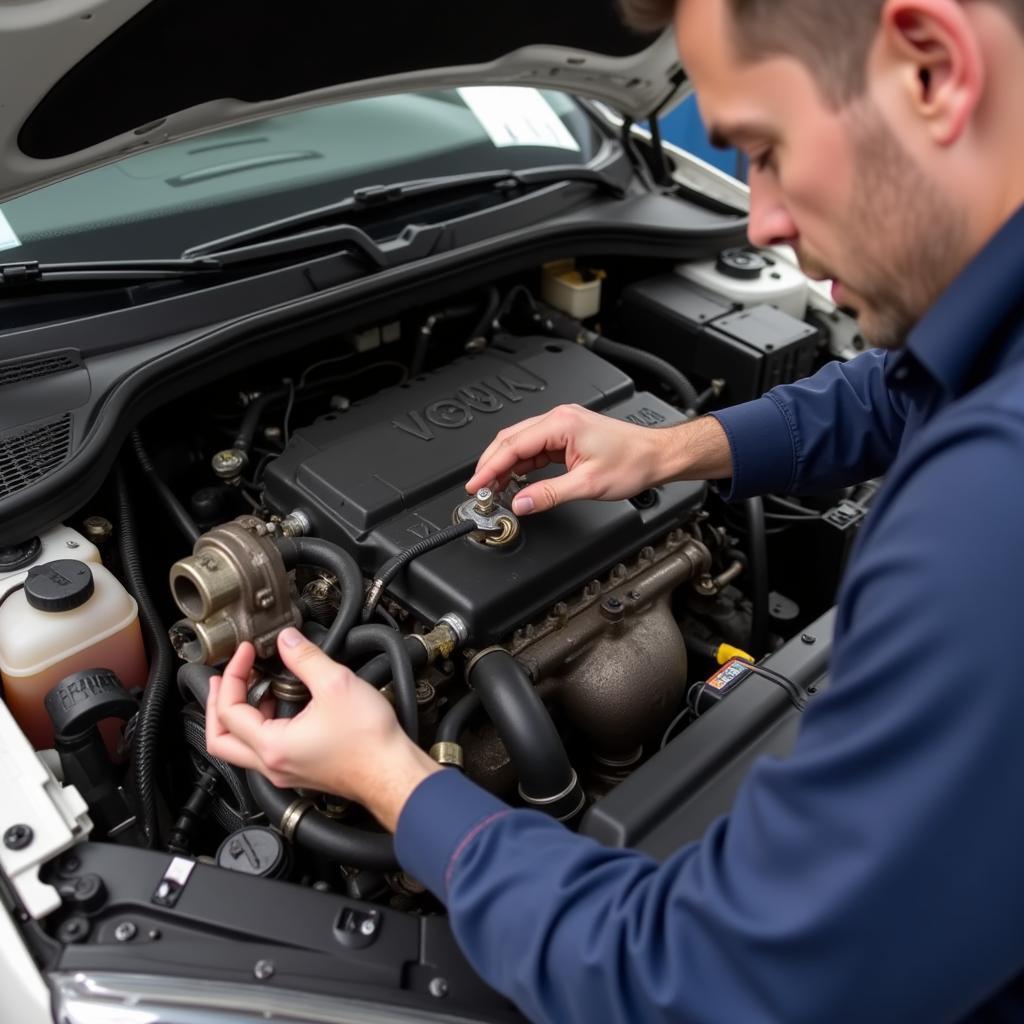Your cart is currently empty!

Understanding and Fixing the 2004 VW Jetta TDI P0299 Code
If your 2004 Volkswagen Jetta TDI has thrown a P0299 code, you’re dealing with a “Turbocharger/Supercharger A Underboost Condition.” This means the engine is not receiving the expected amount of air from the turbocharger. This article will delve into the common causes, symptoms, diagnostic procedures, and solutions for the P0299 code in your 2004 VW Jetta TDI.
What Does a P0299 Code Mean?
The P0299 code indicates that the turbocharger in your Jetta TDI is not producing the boost pressure required by the engine control unit (ECU). Essentially, the ECU is detecting that the actual boost pressure is significantly lower than the desired boost pressure it has commanded.
Common Causes of the P0299 Code in a 2004 VW Jetta TDI
Several factors can contribute to the P0299 code in your VW Jetta TDI. Here are some of the most common culprits:
- Boost Leak: A leak in the intercooler, charge air pipes, or intake manifold can cause a loss of boost pressure.
- Faulty Turbocharger: Issues within the turbocharger itself, such as worn bearings, a damaged impeller, or a malfunctioning actuator, can lead to underboost.
- Boost Control System Malfunction: This system, which includes the N75 valve, vacuum lines, and pressure sensors, is responsible for regulating boost pressure. Any problems here can cause the P0299.
- Restricted Air Intake: A clogged air filter, obstructed intake manifold, or a problem with the mass air flow (MAF) sensor can restrict airflow to the turbo, leading to underboost.
- Exhaust System Restriction: A clogged catalytic converter or a blockage in the exhaust system can create excessive backpressure, hindering the turbocharger’s performance.
Symptoms of a P0299 Code
Recognizing the symptoms of a P0299 code can help you address the issue promptly. Common symptoms include:
- Reduced Engine Power: This is often the most noticeable symptom, with the engine feeling sluggish and lacking acceleration.
- Check Engine Light: The “Check Engine” light will illuminate on your dashboard, prompting you to read the error codes.
- Unusual Noises: You might hear hissing sounds from the engine bay, indicating a potential boost leak.
- Black Smoke from Exhaust: This is a sign of incomplete combustion, which can occur due to a lack of sufficient air in the fuel-air mixture.
- Limp Mode: In severe cases, the ECU might put your car into “limp mode” to prevent further engine damage.
 2004 VW Jetta TDI Engine Bay
2004 VW Jetta TDI Engine Bay
Diagnosing the P0299 Code
Accurately diagnosing the root cause of the P0299 code is essential for an effective repair. Here’s a step-by-step approach:
- Read the Codes: Begin by connecting an OBD-II scanner to your Jetta’s diagnostic port and reading the stored error codes.
- Inspect for Boost Leaks: Carefully examine all the hoses and connections in the intake system, from the turbocharger outlet to the intake manifold. Look for cracks, loose clamps, or signs of leaking.
- Check the Turbocharger: Inspect the turbocharger for any visible damage. Check for shaft play (excessive movement in the turbocharger shaft) by gently moving the shaft radially and axially. Significant play can indicate worn bearings.
- Test the N75 Valve: The N75 valve controls the amount of pressure going to the turbocharger actuator. Use a vacuum pump to test the valve for proper operation.
- Inspect the Vacuum Lines: Ensure all vacuum lines connected to the boost control system are in good condition, properly connected, and free of leaks.
- Check the MAF Sensor: The MAF sensor measures the airflow into the engine. A dirty or faulty sensor can send inaccurate readings, leading to underboost.
 OBD Scanner Connected to 2004 VW Jetta TDI
OBD Scanner Connected to 2004 VW Jetta TDI
Fixing the P0299 Code
The repair for a P0299 code will depend entirely on the specific cause. Here’s what you might need to do:
- Repair Boost Leaks: Replace any cracked, damaged, or loose hoses or clamps. Tighten any loose connections.
- Replace the Turbocharger: If the turbocharger is faulty, replacement is usually necessary. Consider having your turbocharger rebuilt by a specialist if possible.
- Replace Faulty Components: This might involve replacing a malfunctioning N75 valve, boost pressure sensor, or other faulty components within the boost control system.
- Clean or Replace the Air Filter: Ensure the air filter is clean and not obstructing airflow.
- Clean or Replace the MAF Sensor: Clean the MAF sensor using a MAF sensor cleaner. If cleaning doesn’t resolve the issue, consider replacing the sensor.
- Address Exhaust Restrictions: If a clogged catalytic converter or exhaust blockage is detected, have it cleaned or replaced.
Expert Insights
Quote from John S., Senior Diesel Technician: “The P0299 is a fairly common code on TDIs. The key is to not panic and to approach the diagnosis systematically. More often than not, it’s a simple fix like a boost leak or a faulty N75 valve.”
Quote from Maria K., Automotive Engineer: “Regular maintenance is crucial in preventing turbocharger issues. Ensure you use high-quality oil and air filters, and address any unusual noises or performance problems promptly.”
 Mechanic Inspecting Turbocharger in 2004 VW Jetta TDI
Mechanic Inspecting Turbocharger in 2004 VW Jetta TDI
Conclusion
The P0299 code in your 2004 VW Jetta TDI signifies an underboost condition, often pointing to a problem with the turbocharger system. By understanding the potential causes, recognizing the symptoms, and following a systematic diagnostic approach, you can effectively address this issue.
If you’re uncomfortable diagnosing or repairing the issue yourself, it’s best to seek assistance from a qualified mechanic experienced in diesel engines. For professional assistance with your 2004 VW Jetta TDI or any other automotive needs, feel free to contact VCDSTool at +1 (641) 206-8880 and our email address: vcdstool@gmail.com. Our team of experts is ready to assist you at our office located at 6719 W 70th Ave, Arvada, CO 80003, USA.
by
Tags:
Comments
2 responses to “Understanding and Fixing the 2004 VW Jetta TDI P0299 Code”
[…] P0299: This code indicates “Turbocharger/Supercharger A Underboost Condition,” often signifying a problem with the turbocharger system, such as a leak or faulty sensor. This code may be triggered in various VW models, such as the ones discussed in this article about the 2004 VW Jetta TDI code P0299. […]
[…] you’re experiencing this issue in a 2004 vw jetta tdi code p0299, the causes might be similar, but a thorough diagnosis is […]
Leave a Reply